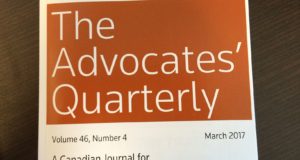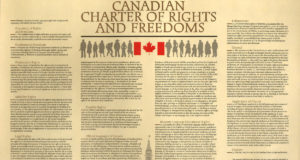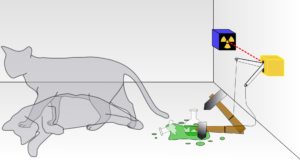The case of Omar Khadr gives scholars a rare opportunity to question the fundamentals of public law damages. Such damages are notoriously difficult to quantify. As Lord Shaw once put it, “the restoration by way of compensation is therefore accomplished to a large extent by the exercise of a sound imagination and the practice of a broad axe.” This is ...
Read More »Tag Archives: Charter of Rights and Freedoms
In Defence of the Notwithstanding Clause and Saskatchewan’s Decision to Use It
Summer is fast approaching and, in keeping with that season’s custom (though not yet a convention), I thought it best to engage Leonid Sirota in constitutional debate. Last year, we went a few rounds on section 7 of the Charter. This year, the hot topic is s.33 of the Charter, otherwise known as the “notwithstanding clause,” which states that Parliament or ...
Read More »The Notwithstanding Clause is no Longer the Nuclear Option
Section 33 of the Canadian Charter of Rights and Freedoms – better known as the “notwithstanding clause” – is one of the most controversial parts of the Canadian constitution. Despite being an integral part of the formation of the Charter, commentators such as Andrew Coyne have suggested that the provision is “dead letter” or “taboo”. But on Monday, Saskatchewan Premier ...
Read More »The Advocates’ Quarterly Publishes “The Paradoxical Presumption of Constitutionality”
The Advocates’ Quarterly, a Canadian Journal for Practitioners of Civil Litigation, has published my paper, “The Paradoxical Presumption of Constitutionality” in its March 2017 edition. The paper, which was also published on this website, argues that the presumption of constitutionality has entered a paradoxical state, in that it simultaneously applies to one part of the Constitution (the division of powers ...
Read More »Vriend v Alberta Revisited: A Road to Constitutional or Judicial Supremacy?
The Supreme Court of Canada has on numerous occasions insisted upon the primacy of the written text of the Constitution.[1] In the Reference Re Secession of Quebec, the Supreme Court explained that the recognition of underlying constitutional principles “could not be taken as an invitation to dispense with the written text of the Constitution”. It noted that “[a] written constitution ...
Read More »Why I am Not a Conservative Either: Thoughts on Chief Justice Joyal’s Address
Glenn D. Joyal, Chief Justice of the Court of Queen’s Bench of Manitoba, gave the keynote address at last January Canadian Constitution Foundation’s recent Law and Freedom Conference. His talk, “The Charter and Canada’s New Political Culture: Are We All Ambassadors Now?”, was interesting and thought-provoking. Although the prepared text has been available on the website of Advocates for the Rule ...
Read More »Chief Justice Joyal Cites ARL Debate
In January, Chief Justice Joyal of the Manitoba Court of Queen’s Bench gave an address at the Canadian Constitution Foundation’s Law & Freedom Conference entitled “The Charter and Canada’s New Political Culture: Are We All Ambassadors Now?” The text of the address was published on this website at the time. The Canadian Constitution Foundation has now released the video of the ...
Read More »Still Playing Favourites: Some Objections to the Court Challenges Program
The federal government has officially announced that it is bringing back the Court Challenges Program, which provides money to individuals or groups who pursue litigation in which they assert certain constitutional or quasi-constitutional rights. In comparison with past iterations, the program will subsidize claims based on a broader range of rights ― not only equality and language rights under the ...
Read More »A Constitutional Pregnancy: A New Approach to Section 1 Following BC FIPA?
Can you get a little bit pregnant? Of course not. But recently, in BC FIPA, the Supreme Court of Canada held that it matters whether the government infringes constitutional rights by a little or a lot. The difference will determine the strength of evidence the government will need to adduce to justify a rights infringement under section 1 of the ...
Read More »The Paradoxical Presumption of Constitutionality
INTRODUCTION Should the courts, in judicially reviewing legislation, employ a presumption constitutionality? Should they, in other words, presume that a law enacted by Parliament or the provincial legislatures is constitutionally valid, rebutting that presumption only in the face of convincing evidence? The answer to this question is not as clear as one might suppose. In the context of the division ...
Read More » Advocates for the Rule of Law
Advocates for the Rule of Law








